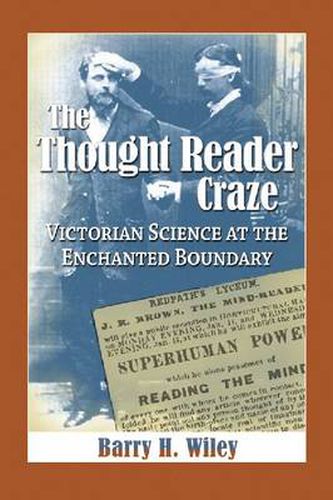Readings Newsletter
Become a Readings Member to make your shopping experience even easier.
Sign in or sign up for free!
You’re not far away from qualifying for FREE standard shipping within Australia
You’ve qualified for FREE standard shipping within Australia
The cart is loading…






This title is printed to order. This book may have been self-published. If so, we cannot guarantee the quality of the content. In the main most books will have gone through the editing process however some may not. We therefore suggest that you be aware of this before ordering this book. If in doubt check either the author or publisher’s details as we are unable to accept any returns unless they are faulty. Please contact us if you have any questions.
Beginning in 1870, the hunger for scientific discovery in Great Britain drove prominent scientists, philosophers, and others to promote the legitimacy of telepathy. At the same time, mind-reading as a form of entertainment gained increasing popularity as persuasive performers like John Randall Brown, W. I. Bishop, and Stuart C. Cumberland convinced reporters that they truly could read the thoughts of others. The widely publicized, sometimes bizarre, interactions between scientists and these charlatans ushered in the Thought Reader Craze, a period that lasted through 1910 and saw entertainers make and lose fortunes and scientists make and lost reputations. This volume explores this unusual cultural phenomenon, showing how it endured through the years due to public scientific pronouncements, astonishing performances by the thought readers, and the rapidly changing industrial society.
$9.00 standard shipping within Australia
FREE standard shipping within Australia for orders over $100.00
Express & International shipping calculated at checkout
Stock availability can be subject to change without notice. We recommend calling the shop or contacting our online team to check availability of low stock items. Please see our Shopping Online page for more details.
This title is printed to order. This book may have been self-published. If so, we cannot guarantee the quality of the content. In the main most books will have gone through the editing process however some may not. We therefore suggest that you be aware of this before ordering this book. If in doubt check either the author or publisher’s details as we are unable to accept any returns unless they are faulty. Please contact us if you have any questions.
Beginning in 1870, the hunger for scientific discovery in Great Britain drove prominent scientists, philosophers, and others to promote the legitimacy of telepathy. At the same time, mind-reading as a form of entertainment gained increasing popularity as persuasive performers like John Randall Brown, W. I. Bishop, and Stuart C. Cumberland convinced reporters that they truly could read the thoughts of others. The widely publicized, sometimes bizarre, interactions between scientists and these charlatans ushered in the Thought Reader Craze, a period that lasted through 1910 and saw entertainers make and lose fortunes and scientists make and lost reputations. This volume explores this unusual cultural phenomenon, showing how it endured through the years due to public scientific pronouncements, astonishing performances by the thought readers, and the rapidly changing industrial society.